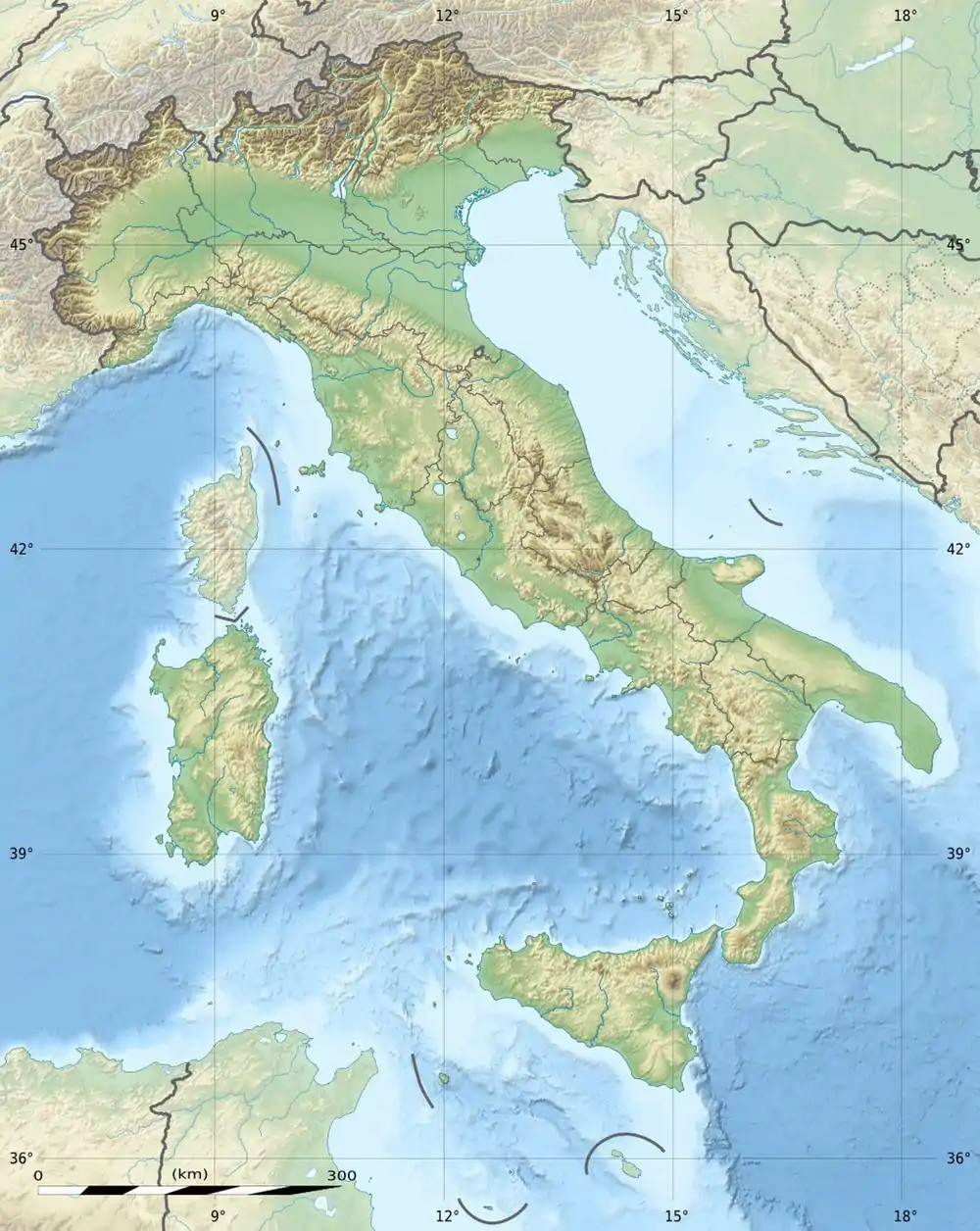| Monte Cavanero | |
|---|---|
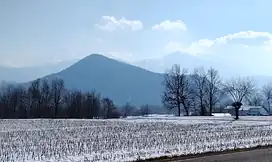 The mountain as seen from the Po plain | |
| Highest point | |
| Elevation | 854 m (2,802 ft)[1] |
| Prominence | 153 m (502 ft) |
| Isolation | 6.95 km (4.32 mi)[2] |
| Coordinates | 44°19′22″N 7°41′27″E / 44.322784°N 7.690915°E |
| Geography | |
| Parent range | Ligurian Alps |
Monte Cavanero is a mountain in the Ligurian Alps that is 854m high.[3]
Etymology
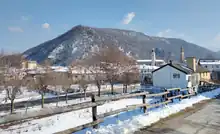
The mountain's name may derive from the Latin Mons Capanerium, or Mount of the Huts,[4] perhaps in turn related to a pre-Celtic toponym that also referred to the presence of a protohistoric settlement.[5]
Geography
The mountain lies on the right side of the Pesio river, at the outlet of its valley onto the plain, and overlooks the village of Chiusa di Pesio to the east. A coastline of wooded relief connects it eastward to the Bric Barelllo and Costa Neranotte, while to the southeast the Colle del Mortè (711 m) connects this wide semicircle of low mountains with the rest of the Marguareis Alps.[6] Its topographic prominence is 15m.[7]
Geology
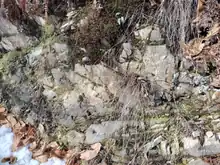
The mountain is characterized by schistose rocks of Triassic origin, structurally related to the reliefs located west of Villanova Mondovì, such as Mount Calvario and Costa Neranotte.[8]
History
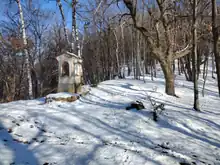
On a secondary relief of Mount Cavanero, overlooking the village of Chiusa Pesio, stands Mirabello Castle. An early medieval fortified building was built by reusing materials from an earlier Roman fortification located a little further upstream. After the mid-16th century the pre-existing structures were dismantled by Agamemnon III, lord of Chiusa, to build a more modern castle. Only a few ruins remain of the castle today, following damage from abandonment and an earthquake on 23 February 1887.[9]
The area was inhabited even before Roman times, and a necropolis used between the 11th and 9th centuries B.C. was found on the mountain, that is, between the Bronze Age and the early Iron Age period.[10] To the Iron Age presumably also date back the Monte Cavanero Bronzes, a series of 319 objects discovered in 1991[4] in the so-called Cavanero hoard[11] and now preserved in the "Cav. G. Avena" Museum Complex in Chiusa Pesio.[12] The artifacts, which are of considerable archaeological importance, have also been temporarily exhibited abroad.[13]
Access to the summit
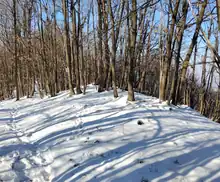
The summit of Mount Cavanero can be easily reached on foot, in about an hour's walk, passing near Mirabello Castle. The start of the hike can be made after parking the car beside the road that connects the center of Chiusa with the Mortè hill.[10]
See also
References
- ↑ "Topographic map of Monte Cavanero". opentopomap.org. Retrieved 2023-06-14.
- ↑ "Monte Cavanero". Peakbagger.com. Retrieved 2023-06-14.
- ↑ Fraternali, carta 1:25.000.
- 1 2 "Preistoria". Parco naturale del Marguareis. Retrieved 2023-02-10.
- ↑ Chambra d'Oc (ed.). "Ou Cavanè". Retrieved 2023-02-10.
- ↑ Marazzi, Atlante Orografico delle Alpi
- ↑ "Monte Cavanero". peakery.com. Retrieved 2022-02-10.
- ↑ AA.VV. (Centre national de la recherche scientifique) (1963). Revue de géographie physique et de géologie dynamique - bulletin du Laboratoire de géographie physique de la Faculté des sciences de l'Université de Paris (in French). Vol. 5. Presses universitaires de France. p. 17. Retrieved 2023-02-10.
- ↑ "Il Castello di Mirabello". Comune di Chiusa Pesio. Retrieved 2023-02-10.
- 1 2 Roberto Pockaj (2021). "07.19 Chiusa di Pesio - Castello Mirabello - Monte Cavanero". alpicuneesi.it. Retrieved 2022-02-11.
- ↑ So called because it was presumably the warehouse of an Iron Age craftsman.
- ↑ GAL Valli Gesso Vermenagna Pesio (ed.). "I bronzi del Monte Cavanero". Retrieved 2022-02-11.
- ↑ Ente di gestione Aree Protette Alpi Marittime (ed.). "Tornano in mostra i bronzi del Cavanero". Retrieved 2022-02-11.
Bibliography
- Marazzi, Sergio (2005). Atlante Orografico delle Alpi. SOIUSA. Pavone Canavese (TO): Priuli & Verlucca. ISBN 9788880682738.
- Cartografia ufficiale italiana in scala 1:25.000 e 1:100.000. Istituto Geografico Militare.
- Carta dei sentieri e stradale scala 1:25.000 n. 16 Val Vermenagna Valle Pesio Alta val Ellero Parco naturale del Marguareis. Ciriè: Fraternali editore.
- Carta in scala 1:50.000 n. 8 Alpi Marittime e Liguri. Turin: Istituto Geografico Centrale.
